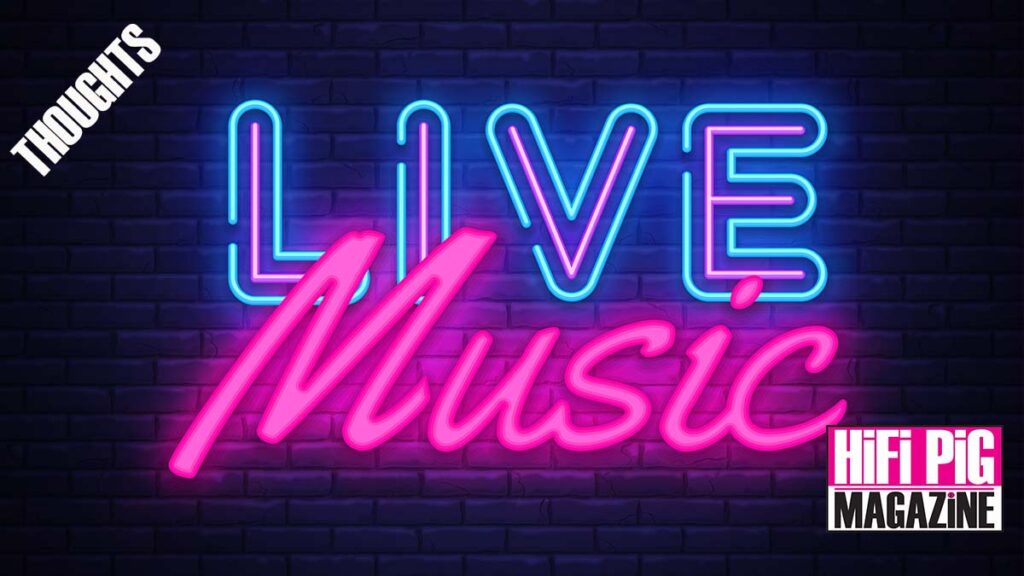There’s something wonderful about going to see live music. The lights go down, the crowd stops yaddering, and suddenly the band is there in front of you. They’re real, loud, imperfect, and utterly live and alive. For many of us, it’s one of life’s true pleasures, and I’d go so far as to say that some gigs have been genuinely transformative for me. I recall my first ever proper gig (The Beat at Wakefield Theatre) when I was around 12. It was all the things I’ve mentioned above and then some. I was hooked from there on in.
But the live gig isn’t just a treat for us as punters. These days, it’s also a lifeline for the bands themselves. With streaming services offering pitiful returns (fractions of a penny per play) and physical media sales nothing like they were back in their heyday, musicians have come to rely heavily on touring and selling merchandise to make any sort of living. Without the ability to get out there and play, many of them simply wouldn’t survive. It’s as simple as that.
And that’s where the problem begins. Because while musicians need venues to play in, the venues themselves are vanishing. And they’re vanishing at an alarming rate.
According to the Music Venue Trust, 2023 was the worst year on record for grassroots music venues in the UK. Around 125 venues either closed or stopped putting on live music altogether. That’s roughly one every three days. That’s not just a few sad-looking buildings with the lights turned off; it’s thousands of job losses, thousands of cancelled events, and countless gigs that never happened. And these aren’t the big chain venues backed by massive corporations. They’re the kinds of places where proper bands cut their teeth. They are the crucible from which greatness is forged. Without these smaller venues, where will the next generation get started?
The picture is bleak. A good proportion of grassroots venues are now running at a loss. They’re being hit by rising rents, eye-watering energy bills, and tiny profit margins.
And it’s not just live music venues. Nightclubs, an essential part of the UK’s musical and cultural heritage, are closing at a frightening pace, with some folk suggesting nightlife as we know it could disappear by 2029 if closures continue at this rate. That’s hundreds of venues gone in the space of just a few years.
So what can we do about it?
The first and most obvious answer is simple: go to gigs. Buy a ticket and turn up. It doesn’t have to be a massive act at a 5,000-capacity arena; just find something local, something that piques your interest, and go. If you like the band, buy a T-shirt, a record, or whatever else they’ve got on the merch stand. That money often goes directly into their pockets and can mean the difference between them getting to the next stop on the tour or not.
Spread the word. Tell your mates. Share the flyer or poster online. If a venue puts on a good night, let other people know about it. Sometimes it only takes a few extra people turning up regularly to make a big difference to a small venue’s bottom line – they pay entry, buy a few pints…
But it’s not just about audiences doing their bit. Venues themselves need to work harder to create spaces that feel inviting and inclusive. That doesn’t mean sanitising the experience, it just means paying attention. A comfortable space, decent sound, good lighting, a welcoming vibe, and accessible facilities can go a long way to broadening the appeal beyond the usual die-hards. Putting thought into the programming of bands and events helps, too. A diverse calendar with something for everyone; jazz one night, indie the next, maybe even a spoken word or open mic session, could keep things interesting enough and bring in a wider range of people.
It’s easy to feel a bit helpless in the face of these closures. After all, we’ve been sold this idea that music is ‘free’ now. Why bother paying when you can hear it all online? But that’s precisely why gigs matter so much. Live music can’t be replicated by a stream or a playlist. It’s immersive, unpredictable, and often messy in all the right ways. It’s a shared experience that connects strangers and makes memories that stick. We all remember a great night out with the connecting glue being the music, but how many recall sitting listening to a streamed album?
And as someone who has been around music in one way or another for decades, I can say with certainty that there’s nothing quite like it.
Support it. Celebrate it. And for fecks’ sake, go out and enjoy it while it’s still there.
Unauthorized use and/or duplication of this material (in part or in full) without express and written permission from this website’s author
and/or owner is strictly prohibited. Links may be used, provided that full and clear credit is given to Hifi Pig and Big Pig Media with appropriate and specific direction (link) to the original content.
Hifi Pig is part of the Big Pig Media LLP group
of companies.
Live Music and Why We Must Save It
Live Music and Why We Must Save It
There’s something wonderful about going to see live music. The lights go down, the crowd stops yaddering, and suddenly the band is there in front of you. They’re real, loud, imperfect, and utterly live and alive. For many of us, it’s one of life’s true pleasures, and I’d go so far as to say that some gigs have been genuinely transformative for me. I recall my first ever proper gig (The Beat at Wakefield Theatre) when I was around 12. It was all the things I’ve mentioned above and then some. I was hooked from there on in.
But the live gig isn’t just a treat for us as punters. These days, it’s also a lifeline for the bands themselves. With streaming services offering pitiful returns (fractions of a penny per play) and physical media sales nothing like they were back in their heyday, musicians have come to rely heavily on touring and selling merchandise to make any sort of living. Without the ability to get out there and play, many of them simply wouldn’t survive. It’s as simple as that.
And that’s where the problem begins. Because while musicians need venues to play in, the venues themselves are vanishing. And they’re vanishing at an alarming rate.
According to the Music Venue Trust, 2023 was the worst year on record for grassroots music venues in the UK. Around 125 venues either closed or stopped putting on live music altogether. That’s roughly one every three days. That’s not just a few sad-looking buildings with the lights turned off; it’s thousands of job losses, thousands of cancelled events, and countless gigs that never happened. And these aren’t the big chain venues backed by massive corporations. They’re the kinds of places where proper bands cut their teeth. They are the crucible from which greatness is forged. Without these smaller venues, where will the next generation get started?
The picture is bleak. A good proportion of grassroots venues are now running at a loss. They’re being hit by rising rents, eye-watering energy bills, and tiny profit margins.
And it’s not just live music venues. Nightclubs, an essential part of the UK’s musical and cultural heritage, are closing at a frightening pace, with some folk suggesting nightlife as we know it could disappear by 2029 if closures continue at this rate. That’s hundreds of venues gone in the space of just a few years.
So what can we do about it?
The first and most obvious answer is simple: go to gigs. Buy a ticket and turn up. It doesn’t have to be a massive act at a 5,000-capacity arena; just find something local, something that piques your interest, and go. If you like the band, buy a T-shirt, a record, or whatever else they’ve got on the merch stand. That money often goes directly into their pockets and can mean the difference between them getting to the next stop on the tour or not.
Spread the word. Tell your mates. Share the flyer or poster online. If a venue puts on a good night, let other people know about it. Sometimes it only takes a few extra people turning up regularly to make a big difference to a small venue’s bottom line – they pay entry, buy a few pints…
But it’s not just about audiences doing their bit. Venues themselves need to work harder to create spaces that feel inviting and inclusive. That doesn’t mean sanitising the experience, it just means paying attention. A comfortable space, decent sound, good lighting, a welcoming vibe, and accessible facilities can go a long way to broadening the appeal beyond the usual die-hards. Putting thought into the programming of bands and events helps, too. A diverse calendar with something for everyone; jazz one night, indie the next, maybe even a spoken word or open mic session, could keep things interesting enough and bring in a wider range of people.
It’s easy to feel a bit helpless in the face of these closures. After all, we’ve been sold this idea that music is ‘free’ now. Why bother paying when you can hear it all online? But that’s precisely why gigs matter so much. Live music can’t be replicated by a stream or a playlist. It’s immersive, unpredictable, and often messy in all the right ways. It’s a shared experience that connects strangers and makes memories that stick. We all remember a great night out with the connecting glue being the music, but how many recall sitting listening to a streamed album?
And as someone who has been around music in one way or another for decades, I can say with certainty that there’s nothing quite like it.
Support it. Celebrate it. And for fecks’ sake, go out and enjoy it while it’s still there.
Stuart Smith
What do you think about the closure of Live Music events? Do you support your local venue? Join the conversation over on social media.
Read More Sunday Thoughts.